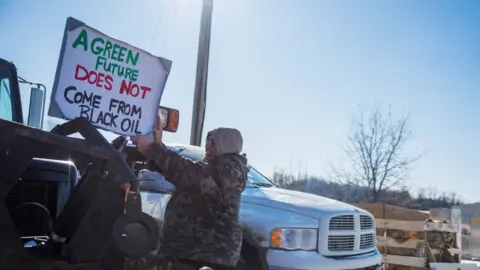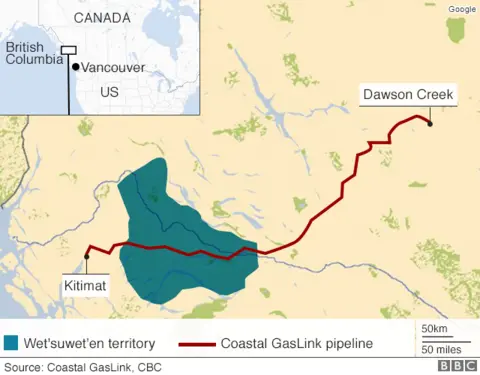Indigenous pipeline blockades spark Canada-wide protests
 Reuters
ReutersMounting protests over a Canadian natural gas pipeline have led to dozens of arrests, buildings occupied and more than 150 train cancellations.
The Coastal GasLink pipeline project would make it easier to export natural gas in British Columbia.
But its route cuts through indigenous Canadian land.
Several indigenous camps have been set up to block access to construction sites, sparking solidarity protests that have swept across the country.
What is the issue?
The Coastal GasLink pipeline is a 670km (416 miles) pipeline that would ship natural gas from north-eastern part of the province to the coast.
The C$6bn ($4.5bn, £4bn) project in a remote part of the province about a day's drive from Vancouver has been in the works since 2012.
Some 28% of the pipeline route passes through Wet'suwet'en lands.
Coastal GasLink says it has reached deals with 20 elected indigenous councils along the route to move ahead with construction, including Wet'suwet'en band councils, coming to agreements on training, employment, and community investment.
Former Wet'suwet'en elected Chief Ray Morris of the Nee Tahi Buhn band told the Canadian Press last January that his elected council signed the agreement to get funds for things like education and elder care.
"We're no different than any other human, we have the same needs as you do," he said.
But Wet'suwet'en hereditary chiefs oppose it and say they, not the community's elected officials, hold authority over traditional lands, warning the project will cause pollution and endanger wildlife.
How did the protests develop?
Camps have been erected along the proposed pipeline route to prevent access to construction sites.
One of the oldest, Unist'ot'en Camp, was erected in 2009 as a checkpoint to control who has access to the land.
It has since expanded into a full camp, with a healing centre and bunks for visitors.
Allow X content?

Unist'ot'en members say it is not a protest or a demonstration.
"Our clan is occupying and using our traditional territory as it has for centuries," they say on the website.
Why are there growing tensions?
An injunction order against the blockade has been in place for more than a year.
Wet'suwet'en hereditary chiefs responded by issuing their own eviction notice against Coastal GasLink a few days later.
Attempts to broker an agreement between the chiefs and the company failed.
Canadian police began enforcing the injunction since last week, and have made 28 arrests as they move to clear the camps.
They arrived at Unist'ot'en on Monday and arrested seven people. Police say that with that, their enforcement of the injunction has concluded.
In an open letter, Coastal GasLink president David Pfeiffer said "this is not the outcome we wanted."
"We have made exceptional efforts to resolve this blockade through engagement and dialogue. Over the past month and over many years, we've reached out to the Hereditary Chiefs, over and over, but to no avail."

But the arrests at the camps are not the end of the opposition against the project.
Activists across the country have protested in solidarity with the Wet'suwet'en hereditary chiefs and their supporters.
Demonstrators have blocked passengers rail lines connecting the major cities of Montreal-Ottawa-Toronto, causing at least 223 trains to be cancelled through Thursday. Over 34,000 passengers have been affected, Via Rail reported.
Police also arrested 43 protesters preventing access to the Vancouver ports on Monday, and more were arrested in nearby Delta.
Protestors have also occupied government buildings and held rallies in cities from St John's, Newfoundland and Labrador to Calgary, Alberta.
